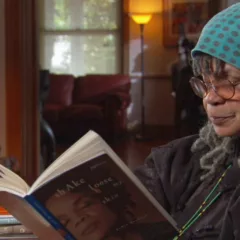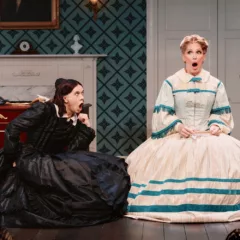by Debra Miller
Theater in Philadelphia is flourishing, and that’s good news for all of us who don’t take a summer break from our love of the arts!
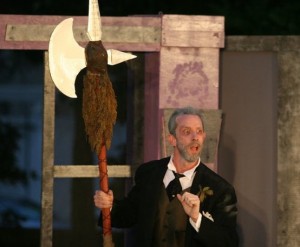
In July, Commonwealth Classic Theatre Company gave the public Free Theatre in the Parks with Moliere’s 17th-century farce The Miser, reset by director Kathryn MacMillan to 1920s Paris, and performed at open-air locations throughout Philadelphia and the surrounding counties. Despite the noisy traffic, shifting passersby, and assorted gawkers at the performance I attended in Love Park, lead actor Charlie DelMarcelle commanded the audience’s attention and stole the show with his physical transformation as the elderly tightwad. It was gratifying to see children, and adults, who generally don’t have access to the arts or can’t afford tickets, enthralled by the makeshift theater and captivating performance.
People’s Light and Theatre

Among the highlights of the summer were two engaging productions at People’s Light and Theatre Company in Malvern. The retelling of Hans Christian Andersen’s The Emperor’s New Clothes was a hit for all ages; kids loved the slapstick, and adults the clever wit and physical comedy, derived in part from the panto tradition that the company has adopted for its holiday shows of the past six years. Pete Pryor as A Rogue Who Talks and Christopher Patrick Mullen as A Rogue Who Doesn’t were outstanding as the madcap leads in an all-star cast that transported its audience to the magical world of a fairytale.
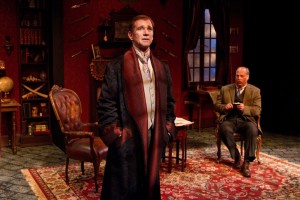
Acting also reigns supreme in The Secret of Sherlock Holmes (extended through August 15), with Peter DeLaurier as the eponymous detective and Mark Lazar as Dr. Watson. The accomplished two-man cast is supported by sumptuous Victorian costumes and set, and black-and-white video projections that evoke the mysterious Professor Moriarty.
Temple Repertory Theater
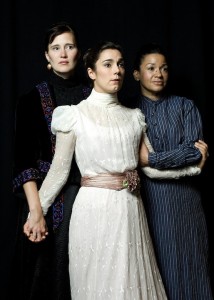
In its inaugural season, Temple Repertory Theater presented new interpretations of classics by Chekhov (The Three Sisters) and Shakespeare (Measure for Measure), employing an artistic staff affiliated with Temple University, and a troupe of actors currently working towards their Master’s degrees. Temple’s large-scale Tomlinson Theater was reconfigured into an intimate space, with audience members seated onstage, up close to such award-winning luminaries as Dan Kern and Geneviève Perrier, and within feet of Dirk Durossette’s sets and Millie Hiibel’s costumes.

Already one of the most respected theater departments in the region, Temple’s new repertory endeavor can only enhance its reputation, with faculty, alumni, and students that read like a Who’s Who of Philadelphia’s theater community.
Philadelphia Shakespeare Theatre
Another important training ground for young actors is Philadelphia Shakespeare Theatre’s Classical Acting Academy, now in its second year of presenting free summer productions with talented student casts. A brilliantly re-invented Henry V, directed by the ever-imaginative Aaron Cromie, runs through August 15. Cromie uses the premise of a play-within-a-play; for their final exam, students in a classroom portray the historical characters, to learn their life lessons and Shakespeare’s universal themes.

The ensemble is consistently excellent; they are the emerging talents to watch in Philadelphia. Especially noteworthy is Michael Gregory as the king, whose regal and imperious attitude, and total mastery of the Elizabethan language, display maturity beyond his twenty years. Victoria Rose Bonito and Bethany Ditnes are also standouts, in a hilarious scene of the French princess attempting to learn English. This production should not be missed; free tickets are available on a first-come-first-served basis three hours before each performance.
This year’s Barrymore Nominations
Also this summer, the highly anticipated nominations for the Barrymore Awards for Excellence in Theatre for 2009-10 were announced by the Theatre Alliance of Greater Philadelphia (TAGP). Foremost was a Special Recognition Award for the incomparable Pete Pryor, who seemed genuinely thrilled by the honor and the enthusiastic standing ovation he received. Pryor, who has been nominated for a record 17 Barrymore Awards, recently participated in the prestigious Lunt-Fontanne Fellowship Program, a highly visible national distinction for the top regional theater actors in the country. No one deserves the accolades more; we are very fortunate to have him in Philadelphia.
Before announcing the nominees, Theatre Alliance stated its goals of doubling ticket sales by 2020, and shifting public perception of theater in Philadelphia “from elitist to accessible.” Considering our country’s economy, these will be daunting tasks, perhaps realized only by promoting the outstanding small companies with affordable tickets that have enlivened the scene over the past two decades.
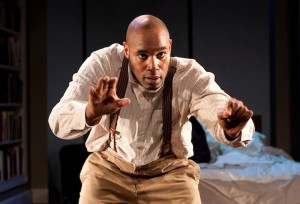
With few exceptions, the Barrymore nominations evinced much of the same consistent taste and local favorites of past years, to the exclusion of many of the best new companies doing first-rate work on shoestring budgets. Nothing for the remarkable seasons of EgoPo or Inis Nua, nothing for New City Stage, nothing for BCKSEET or Amaryllis or Flashpoint or Luna, nothing for Philadelphia Shakespeare Theatre, though all were among my top picks for the most compelling, intelligent, and imaginative productions of the year, with stellar performances by their casts (see my post of June 25, 2010).
Among the mainstays were 21 nominations for Walnut Street, 18 for Arden, 12 for Philadelphia Theatre Company, 9 for the Wilma. Am I the only one who has noticed a direct correlation between annual budget/age of company and number of nominations? This is not to imply that the nominees shouldn’t be congratulated for their accomplishments, but simply to question if the smaller, newer companies can compete on equal ground against such financial disparity and longtime establishments?
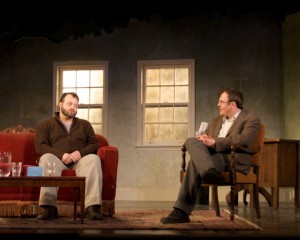
After last year’s controversial snubs, Theatre Exile and Lantern Theater Company were recognized this time. Exile’s five nominations were spread equitably among its three exceptional productions, and included two of my selections for acting nominations (Pete Pryor for Best Supporting Actor in Any Given Monday, co-produced by Act II Playhouse; and Scott Greer for Best Actor in Shining City). Lantern’s twelve nominations were not as well balanced, coming up short for Shakespeare, with only a single nod to its superb acting (Andrew Kane for Best Supporting Actor), one for J. Alex Cordaro’s masterful choreography, and one with Da Vinci Art Alliance for New Approaches to Collaboration.
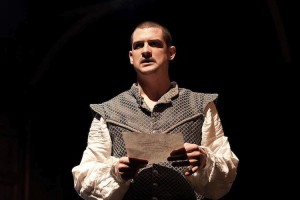
I’m happy that two of my other top picks were nominated: Dave Jadico for his well-designed rustic set for Delaware Theatre Company’s The Foocy; and Kes Khemnu for his stirring story-telling in Arden’s Blue Door, as Best Supporting Actor—perhaps the most competitive category this year.
I hope that the rest of my top picks feel honored by the critical acclaim and audience response they received, and by the personal gratification their outstanding talent brings them; I look forward to more of their excellent work in 2010-11. Winners of this year’s Barrymores will be announced at the awards ceremony on Monday, October 4.
[In the interests of full disclosure, I serve as President of the Board of Directors of Da Vinci Art Alliance, and as a Barrymore voter for 2010-11].



